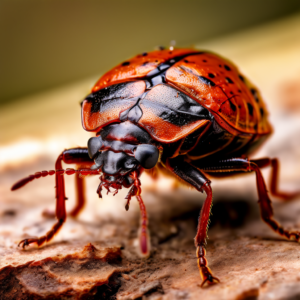Does Lysol Kill Bed Bugs?
Does Lysol Kill Bed Bugs?
Yes and No; Lysol is not considered an effective standalone treatment for bed bug infestations, despite its ability to kill some bed bugs on direct contact. Here’s a comprehensive look at why Lysol falls short and what alternatives are more effective:
Limitations of Lysol for Bed Bug Control
- Contact Requirement: Lysol needs to be sprayed directly on bed bugs to be effective
However, bed bugs are cryptic insects that spend most of their time hiding in cracks, crevices, and other hard-to-reach areas, making it nearly impossible to contact all bugs with the spray
- Insufficient Penetration: Lysol is not designed to penetrate the small spaces where bed bugs hide. Simply spraying surfaces is unlikely to reach all the bugs in an infestation
- Egg Resilience: Bed bug eggs are particularly hardy and may not be affected by Lysol. This means that even if some adult bed bugs are killed, new ones could hatch and continue the infestation
- Lack of Residual Effect: Lysol does not provide long-lasting protection against bed bugs. Once it dries, it loses its effectiveness, allowing surviving bed bugs to continue reproducing

bed bug
Effective Bed Bug Treatment Strategies
Instead of relying on Lysol, consider these more effective methods for dealing with bed bug infestations:
- Heat Treatment: Washing and drying bedding, clothes, and other items at high temperatures (at least 130°F) or ( at least 55 °C ) can effectively kill bed bugs and their eggs
- Professional Extermination: Pest control professionals have access to more potent insecticides and specialized equipment for thorough bed bug elimination
- Desiccants: Products like diatomaceous earth can be effective in some situations by drying out bed bugs
- Steam Cleaning: Steam cleaners can reach temperatures high enough to kill bed bugs in carpets, baseboards, bed frames, and other furniture
- Mattress Encasements: Using bed bug-proof covers on mattresses and box springs can trap and eventually starve bed bugs
- Decluttering and Sealing: Removing clutter and sealing cracks and crevices can eliminate hiding spots for bed bugs
Integrated Pest Management Approach
The Environmental Protection Agency (EPA) recommends using an Integrated Pest Management (IPM) approach, which combines both chemical and non-chemical treatments for effective bed bug control. This comprehensive strategy is more likely to succeed than relying on a single method like Lysol.
Conclusion
While Lysol may kill some bed bugs on direct contact, it is not a reliable or comprehensive solution for bed bug infestations. The resilience and hiding behavior of bed bugs make them particularly challenging to eliminate. For effective bed bug control, it’s best to use a combination of methods or seek professional help. Remember, early detection and prompt action are key to preventing widespread infestations and ensuring successful eradication.
Natural Alternatives to Lysol for Killing Bed Bugs
1. Diatomaceous Earth
Diatomaceous earth is a natural powder that dehydrates and kills bed bugs by damaging their exoskeleton. It is safe to use around humans and pets and can be applied to areas where bed bugs are likely to hide, such as cracks, crevices, and around the bed.
2. Essential Oils
Certain essential oils have insecticidal properties and can repel or kill bed bugs:
- Lavender Oil: Known for its pleasant scent and insecticidal properties, lavender oil can repel bed bugs. Mix 10-15 drops with water in a spray bottle and apply it to infested area
- Tea Tree Oil: This oil can suffocate bed bugs. Mix 20 drops with distilled water and spray it on beds and other infested areas.
- Peppermint Oil: The strong scent of peppermint oil repels bed bugs. Apply it similarly to lavender oil.
- Eucalyptus Oil: Contains eucalyptol, a natural insecticide. Dilute 10-20 drops in water and spray on beddings.
3. Baking Soda
Baking soda is believed to dehydrate bed bugs by absorbing the fluids on their exoskeleton. Sprinkle it around infested areas and vacuum it up after a few days. However, its effectiveness is debated and not scientifically proven
4. Vinegar
Vinegar can kill bed bugs on contact due to its high acidity, which can damage their nervous system. However, it requires direct application to be effective and does not kill eggs.
5. Heat Treatment
Heat is one of the most effective natural methods for killing bed bugs. Washing and drying infested items at high temperatures (at least 130°F) or ( at least 55 °C )
can kill both bed bugs and their eggs. Steam cleaning infested areas can also be effective
6. Freezing
Exposing bed bugs to freezing temperatures can kill them. Place infested items in a freezer for 8-10 hours. Ensure the freezer is cold enough to be effective. Read More
7. Encasements
Using bed bug-proof mattress and box spring encasements can trap and starve bed bugs, preventing them from spreading.
Conclusion
While Lysol can kill bed bugs on direct contact, it is not a reliable solution for infestations. Natural alternatives like diatomaceous earth, essential oils, baking soda, vinegar, heat treatment, freezing, and encasements offer safer and often more effective methods for dealing with bed bugs. For severe infestations, professional pest control services are recommended for comprehensive treatment.